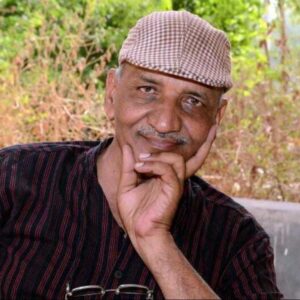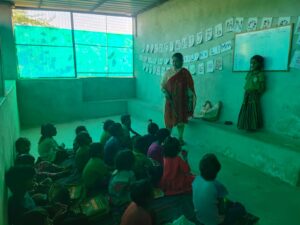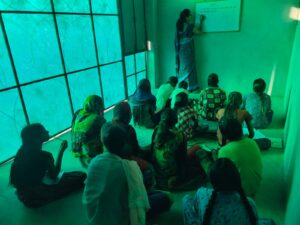In November 2023, GoaChronicle visited the settlement of the Hindu immigrants from Pakistan, situated in Jodhpur’s Kali Beri. In a detailed report, we told you how these Hindus, who do not even have the right to be called ‘refugees’ in India, left their jobs, family members, their sense of settlement, and the land they belonged in, only to protect their religious identity.
While they continue to fight battles every day for a better life in India, there is the ‘Universal Just Action Society’ (UJAS), working for the rights, the Hindu immigrants deserve, and supporting them in this battle of dignity, for their integrated development as a community.
UJAS advocates for Pakistani immigrants in India who are fleeing religious persecution, and who, despite escaping dangers in Pakistan, are still denied basic human rights in India. Among these are the rights to citizenship, rehabilitation, livelihood, and education.
UJAS continues to work for the integrated development of the Hindus from Pakistan, and a community-based organization, also founded by Sodha, the ‘Seemant Lok Sangathan’, works as a crucial instrument for the advocacy of Hindu immigrants’ rights, with the government.
To find out how UJAS works, and to get a deeper insight into the problems faced by the Hindu immigrants from Pakistan, living in India, Sonakshi Datta of GoaChronicle had a detailed conversation with UJAS Founder, Hindu Singh Sodha.

UJAS Founder, Hindu Singh Sodha
How and when did ‘Universal Just Action Society’ come into being?
We had initiated UJAS in 2008, but before that, we worked through a community-based organization (CBO), the Pak Visthapit Sangh (PVS). Then, in between 2005-06, when power of giving citizenship was delegated to the state, we moved across all of the border area, listening to the problems of the people, and founded another CBO, the ‘Seemant Lok Sangathan’ (Border area People’s Organization). Till date, the Seemant Lok Sangathan is a crucial instrument in the advocacy of the issues faced by the Hindu immigrants from Pakistan to India, with the government.
Another important problem to be focused upon became the integrated development of the immigrants; while getting citizenships can take as long as 20-25 years, what needs to be taken care of is aspects like education and healthcare. And working for the immigrants for 15 years, we have realized that these facets suffer a lot. For this very integrated development, we came up with UJAS.
What is the mission and vision of UJAS?
Our mission is to advocate for the rights of the Hindu immigrants from Pakistan, who faced religious persecution and discrimination back there, and fled to India to escape from the same. But in India too, their basic human rights are delayed and denied, the most important among them being citizenship, rehabilitation, livelihood, their right to health and education. Hence, our mission is to help these immigrants obtain justice, by raising awareness among them and empowering them; and pressurizing the government to provide them with their legal rights.
How and when did the settlements of the Hindu migrants from Pakistan in India take form?
The immigrants started settling at the Kali Beri settlement in Jodhpur, that you visited, back in 1997-98, and people are coming till date. Apart from Kali Beri, when we talk about the migration, there are innumerable such settlements in villages. All the migrants have come to India during different time phases, one being after the 1965 Indo-Pak war. Another major exodus took place after the 1971 war. Till date, we are dealing with the issues faced by such people.
I, myself, have visited around 1000 villages having such settlements on the border area, starting from Sri Ganganagar, Bikaner, Jaisalmer, Barmer, and in Gujarat.
If we talk about the migration per se, the roots of this phenomenon go back to the partition of 1947. Pakistan instantly claimed itself to be the ‘Islamic Republic of Pakistan’, and as a result, all other religious communities were bound to suffer.
So, the first wave of migration took place in 1965, with around 10 thousand people coming to India, from the Rajasthan-Pakistan border; the second phase took place in 1971, when 90 thousand people moved here. The third wave started when the Babri Masjid- Ram Mandir episode was taking place in India. That was one of the worst phases for the Hindus of Pakistan. In India, while only one structure was demolished, in Pakistan, hundreds of old and contemporary mandirs were demolished. Hindus were tortured, beaten, killed, particularly minor girls were abducted, raped, and were forcefully married to elderly Muslim men.
People migrated in such horrible conditions, and those migrants staying particularly in Jodhpur, are called ‘recent migrants’, because they started coming to India in the 1990s, during the third wave of migration. Jodhpur has become a transit point of sorts for the migrants because as per an order by the Indian government, they are not allowed to move towards the western side of National Highway 15.


Glimpses of classes going on in school run by UJAS, with support of Children’s Hope India (CHI) in the Anganwa settlement, Jodhpur, for Hindu immigrants from Pakistan
What made you come from Pakistan to India? When did this happen?
My family migrated from Pakistan to India ten months before the 1971 war. Being politically active, ours was the only family in Pakistan that openly advocated for the rights of the Hindus living there, which did not go down well with the state machinery.
How did you receive the Indian citizenship? What difficulties did you face for the same?
When I came to India, I took admission into the 10th standard, and some personal problems which I faced were like learning Hindi, and I was luckily able to pass with flying colours. I pursued law for my higher studies, and that was when I received the Indian citizenship, in 1978. The then Janata Party government, even before coming to power, had promised citizenships and rehabilitation to the migrants.
How will you describe the transition journey from being a Pakistani citizen to becoming an Indian one?
It was indeed very painful to leave the place I belonged in. For us, that was not Pakistan, it was only 25 years after the partition in 1947, therefore, for us, it was our homeland more than it was Pakistan. It was the land of my ancestors who had lived there for centuries. Otherwise, things were a little easy here in India because my mother belonged in the Indian side of the border, from Pali district, and my father had studied in Jodhpur.
How did your journey of becoming a student leader begin?
I think becoming a student leader is owed to the kind of politically charged environment I was brought up in. Then, I made friends with individuals who were politically active. I was the Founder-President of our organization, the ‘Chhatra Sangharsh Samiti’.
How different are the lives of the Hindu immigrants in settlements in India than they were in Pakistan?
In Pakistan, they faced the worst kind of discrimination and desecration of their places of worship; in India, at least this is not there. But then, the need is to have a legal framework which is friendly to the immigrants. From the day these immigrants come to India till the time they receive citizenship, there is not a single thing which is provided by the Indian government.
What difficulties do the governments (both state and Centre) create for the immigrants?
Both the state and central governments should join hands to resolve this issue. The Indian government should also look at making the process to grant citizenships to the immigrants, simpler. It is unfortunate that since 2019, only 25 percent of the eligible immigrants have received the citizenship, due to the complicated procedure at place. Hence, this marks a major problem for the immigrants.
How do you think the lives of the immigrants should be improve, not only by the governments and authorities, but by their fellow Hindus in India?
Honestly, what the immigrants need much more, is the feeling of brotherhood, love, and empathy. All this is required for their wounds to heal, as it is not at all easy to flee the land they belonged in, and begin their lives from scratch here in India.
What appeal would you like to make to the Hindus in India for the Hindu immigrants from Pakistan?
Hindus should stand with the immigrants, and pressurize both the state and central governments to come up with friendly policies for the immigrants. All the Hindu immigrants will always require, is love and a feeling of inclusion. In India, they are being treated as Pakistanis, and in Pakistan, they are ‘Kafir’ and nothing more. This has to stop, and the Hindus of India can be of great help to create a conducive environment for the same.
































